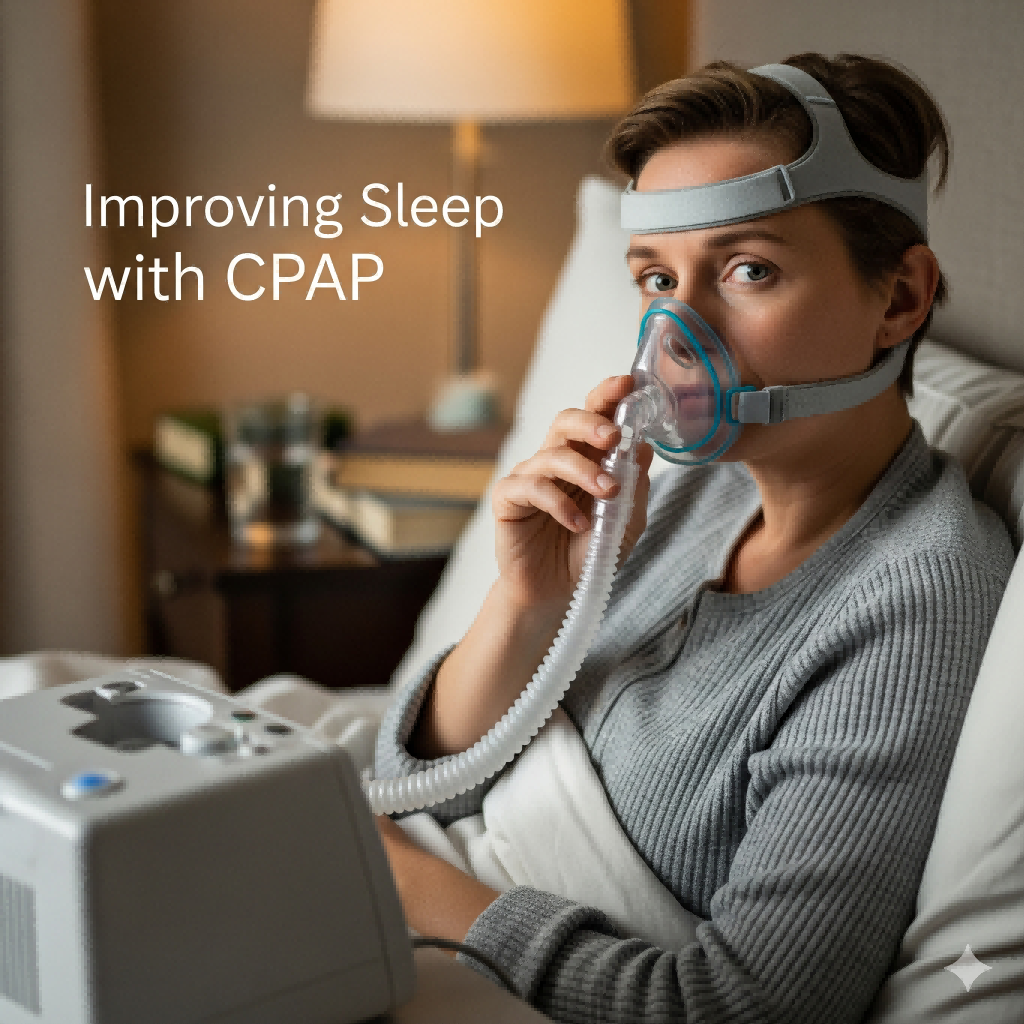How Many Hours a Night Should You Use a CPAP Machine? (Complete Guide)


Introduction to CPAP Therapy
Continuous Positive Airway Pressure (CPAP) therapy is the gold standard treatment for obstructive sleep apnea (OSA), a condition that causes pauses in breathing during sleep. Left untreated, sleep apnea can lead to daytime fatigue, cardiovascular problems, high blood pressure, and reduced quality of life.
But one of the most common questions patients ask is: “How many hours a night should you use a CPAP machine?” The answer is essential because the effectiveness of CPAP therapy depends heavily on consistent and proper usage.
What is a CPAP Machine?
A CPAP machine delivers a steady stream of pressurized air through a mask, keeping your airway open while you sleep. This prevents apnea episodes, improves oxygen levels, and helps you achieve restorative sleep.
Why CPAP is Prescribed for Sleep Apnea
Doctors recommend CPAP to reduce the risks of:
- Loud snoring and restless sleep
- Daytime drowsiness and poor concentration
- Heart disease, stroke, and high blood pressure
- Metabolic disorders like type 2 diabetes
The Role of Consistent Use in Treatment
For CPAP therapy to work, it must be used consistently—ideally every night and for the majority of your sleep duration. Sporadic use significantly reduces its effectiveness and negates many of the health benefits.
Recommended CPAP Usage: Hours Per Night
Medical Guidelines for CPAP Usage
Doctors and sleep specialists recommend using your CPAP machine for at least 6 to 8 hours per night, which typically matches the average adult’s sleep cycle.
Minimum vs. Optimal Hours of CPAP Use
- Minimum requirement: 4 hours per night (often required by insurance companies to consider the therapy “compliant”).
- Optimal usage: 6–8 hours per night for maximum health benefits.
How Long Does It Take to See Benefits?
Some people notice improvements after the very first night, while others may take a few weeks. The key factor is consistent nightly usage, since benefits build over time.
Why CPAP Hours Matter
Effects of Inconsistent CPAP Use
Using CPAP for only part of the night allows apnea events to return, especially during REM sleep, when breathing interruptions are more severe.
Daytime Sleepiness and Fatigue
If you remove your CPAP after only a few hours, you may still feel tired the next day because your brain and body didn’t receive the full benefits of uninterrupted oxygen.
Long-Term Health Risks of Not Using CPAP Enough
Chronic underuse of CPAP is linked to:
- High blood pressure
- Heart arrhythmias
- Stroke risk
- Insulin resistance and type 2 diabetes
Factors Influencing CPAP Usage Duration
Severity of Sleep Apnea
The more severe your sleep apnea, the more critical it is to use CPAP throughout the night. Patients with severe OSA often experience dozens of breathing interruptions per hour. For them, even a few hours without CPAP can significantly impact oxygen levels and sleep quality.
Comfort and Mask Fit
A poorly fitting mask can discourage long-term use. Leaks, discomfort, or skin irritation may lead to people removing their masks after only a few hours. Choosing the right mask type—nasal, full-face, or nasal pillows—can make the difference between struggling with therapy and using it all night comfortably.
Lifestyle and Sleep Habits
Late-night screen time, irregular bedtimes, and frequent awakenings can shorten CPAP use. People who fall asleep in front of the TV without their machine also miss critical therapy hours. Consistent sleep hygiene supports longer and more effective CPAP use.
Machine Type and Technology
Modern CPAP machines come with features like auto-adjusting pressure, humidifiers, and quiet motors. These upgrades increase comfort and reduce the chances of removing the mask in the middle of the night, ultimately boosting compliance.
Tips to Increase CPAP Compliance
Adjusting to Wearing a Mask
Start by wearing your mask for short periods while awake. Read, watch TV, or listen to music while wearing it. Gradually, your brain adjusts, and the mask feels less intrusive.
Creating a Bedtime Routine
Consistency is key. Incorporating CPAP into a relaxing nightly routine—like dimming lights, avoiding caffeine, and using calming music—makes it easier to stick with therapy.
Using CPAP While Napping
Even short naps can trigger apnea episodes. Using CPAP during naps not only helps your health but also boosts your nightly usage hours, keeping you compliant with medical and insurance guidelines.
Cleaning and Maintenance for Comfort
A dirty CPAP mask or tubing can cause discomfort, skin irritation, and bad odors. Regular cleaning makes therapy more pleasant and encourages longer nightly use.
Common CPAP Usage Challenges
Discomfort and Claustrophobia
Many new users feel “closed in” with a CPAP mask. Choosing a smaller nasal pillow mask or practicing with the mask during the day can ease this anxiety.
Dry Mouth and Nasal Congestion
Low humidity levels often cause dryness. Using a heated humidifier or switching to a full-face mask helps prevent these issues.
Pressure Intolerance
Some patients feel the air pressure is too strong. In these cases, doctors may prescribe AutoPAP or BiPAP machines, which automatically adjust pressure levels for comfort.
Frequent Awakening or Mask Leaks
Leaks reduce therapy effectiveness and disturb sleep. Repositioning the mask, replacing worn-out cushions, or switching mask styles can resolve the issue.
Alternatives and Complementary Therapies
BiPAP and AutoPAP Machines
For patients struggling with standard CPAP, BiPAP (Bilevel Positive Airway Pressure) and AutoPAP machines offer more flexibility. They automatically adjust air pressure, making therapy more comfortable.
Oral Appliances
Dentists sometimes recommend mouthguards that reposition the jaw to keep airways open. While not as effective as CPAP, they can help mild to moderate apnea cases.
Lifestyle Changes (Weight Loss, Exercise)
Healthy weight management, regular physical activity, and avoiding alcohol before bed can reduce the severity of sleep apnea and complement CPAP therapy.
Tracking and Monitoring CPAP Usage
Built-In Machine Data
Most CPAP machines record your nightly usage hours, mask seal quality, and apnea events. This information helps doctors adjust treatment.
Apps and Smart Devices
Many machines connect to smartphone apps that provide feedback, reminders, and progress charts. Seeing results can motivate patients to stick with therapy.
Doctor Follow-Ups and Adjustments
Regular appointments allow your doctor to review data, troubleshoot issues, and adjust settings to maximize comfort and effectiveness.
FAQs About CPAP Usage
Is it okay to skip CPAP for one night?
Occasional missed nights may not cause long-term harm, but even one night without CPAP can bring back snoring, fatigue, and poor sleep. Over time, skipping therapy increases health risks.
Can you use CPAP too much?
No. CPAP is designed to be used every time you sleep. The longer you use it, the more consistent the benefits.
What happens if you only use CPAP for 4 hours?
Four hours may meet insurance compliance, but it’s not enough for full health benefits. You’ll likely still feel tired and may not prevent apnea events during REM sleep.
Do naps count toward CPAP hours?
Yes. Using CPAP during naps adds to your total usage hours and ensures you stay protected even during short sleep periods.
Will insurance check CPAP usage hours?
Yes. Most insurance companies require proof of at least 4 hours of use per night on 70% of nights during the first 90 days to continue covering the device.
Can CPAP cure sleep apnea permanently?
No. CPAP is a treatment, not a cure. It only works when used consistently. However, lifestyle changes such as weight loss may reduce dependence on CPAP for some patients.
Conclusion: Getting the Most from Your CPAP Machine
So, how many hours a night should you use a CPAP machine?
The answer is clear: as many hours as you sleep—ideally 6 to 8 hours per night. While the minimum requirement for insurance compliance is 4 hours, optimal health benefits come from full-night use.
By overcoming common challenges, tracking your progress, and making CPAP part of your nightly routine, you’ll not only improve sleep quality but also protect your long-term health. Remember: CPAP works best when you use it consistently, every single night.
For more information, you can visit the American Sleep Apnea Association for expert resources.
















